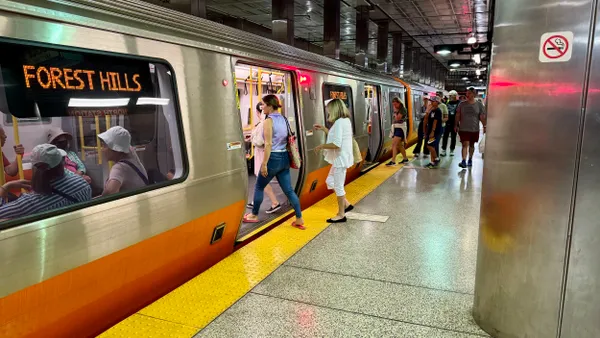Dive Brief:
- A partnership between Ford and Microsoft is using "quantum-inspired technology" to address traffic congestion on a massive scale by delivering "balanced routing" to thousands of drivers at a time.
- Rather than giving individual drivers the optimum route — which can send multiple drivers onto the same streets and create congestion — the quantum computing method simultaneously tests multiple routes and balances them among all drivers. In simulated tests based on Seattle streets, there was a 73% improvement in total congestion and an 8% reduction in the average commuting time, according to a Medium post from Ford Chief Technology Officer Ken Washington.
- Ford and Microsoft have also completed a simulation for Detroit and are working on one for Las Vegas ahead of January's CES convention. The companies say they will expand the partnership to refine the balanced route algorithm and test it against real-world scenarios, like when streets are closed or if drivers opt out of suggested routes.
Dive Insight:
As part of its push to become a full-fledged mobility company, Ford has looked to data analysis and advanced computing to solve city-wide challenges. That work has included research into autonomous vehicles (AVs) with Argo AI, the acquisition of Journey Holding to work on intelligent transportation systems, and a micromobility arm with Spin. Earlier this year, the company detailed how it was using data visualization and advanced software to help six cities work on real-world challenges like parking, safety and congestion through its City Insight Platform, and has fostered solutions to city-specific challenges through its City:One challenges.
The Microsoft partnership, which dates back to 2018, takes congestion head-on by analyzing the impact of thousands of drivers on the road at the same time. The ability to use quantum-style computing to analyze vast amounts of data helped model the optimum route for every driver to have a net positive effect on congestion. Even by looking at 5,000 vehicles with 10 different route choices available, balanced routing suggestions were made in 20 seconds. The net effect, according to Ford, was more than 55,000 total hours saved in congestion over a year.
"By taking what we’ve learned about quantum computing and bringing it to hardware that’s already available, we don’t have to wait until quantum computers are deployed on a wide scale to take advantage of the technology,” said Julie Love, a Microsoft senior director working on quantum computing. "Using world-class quantum algorithms customized for specific problems, we can bring measurable improvements and drive change that can impact people’s lives."
With Ford also using advanced data to tackle issues like parking availability and safety concerns on roadways, the automaker is clearly seeking to position itself as an ally to cities as they continue to confront new mobility questions.










